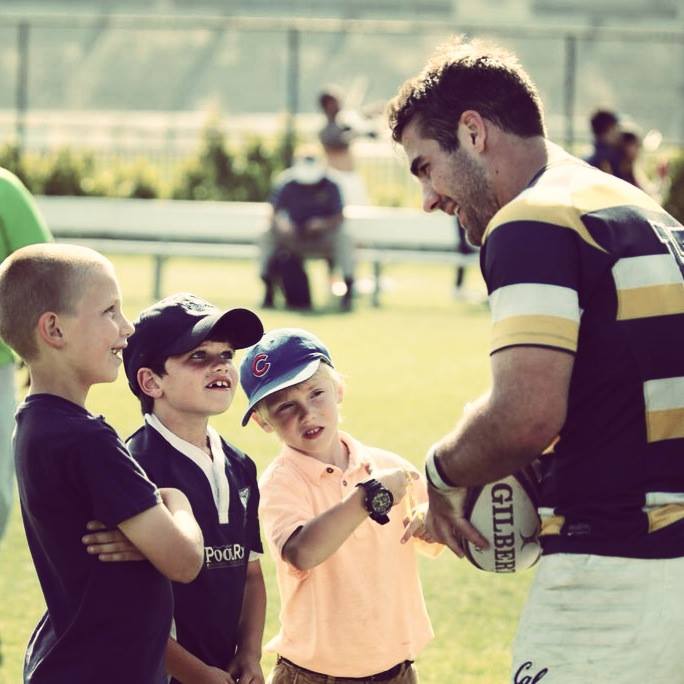
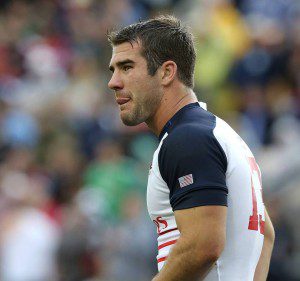 RWU HQ – This week I had the chance to catch up with USA Rugby Eagles star Seamus Kelly and picked his brain. Here’s what he had to say:
RWU HQ – This week I had the chance to catch up with USA Rugby Eagles star Seamus Kelly and picked his brain. Here’s what he had to say:
Q: When was the first time you saw rugby being played and how soon after did you lace up the boots? Was it love at first collision?
A: I first became interested in rugby after deciding to go to Xavier High School. After playing football a lot of guys would go on to play rugby, so I started to look into it. I ordered a DVD of the 2003 World Cup Final to get an idea of the game. That was the first time I watched rugby, and it was not a bad place to start. The game is legendary and I was hooked.
Q: You were a pretty good gridiron football player at Xavier with the nickname Famous Seamus. Did that carryover into rugby and do you have any other nicknames?
A: It has carried over a bit, but for some reason people like to give me grief about it…think its jealousy.
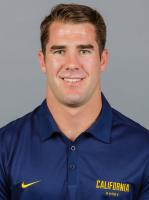
Q: Being from New York, why did you choose University of California, Berkeley? Did rugby weigh into the decision?
A: I was set on playing football in college, but wanted to have a rugby option. Looking more into it Cal really stood out so with some help from Tolks [USA Head Coach Mike Tolkin]. I was lucky enough to go on a visit to Berkeley, meet the coaches and some players and watch a match. I made my decision on that trip, the environment at Cal surrounding rugby was exactly what I was looking for. It was just as, if not more, professional/high performance than any Division I football program I had seen and it was a chance to get a world class education. Rugby was definitely a factor in my decision, but the University itself is a special place that I wanted to experience.
Q: Being a Queens, NY guy, how long did it take you to get used to friendly Californians?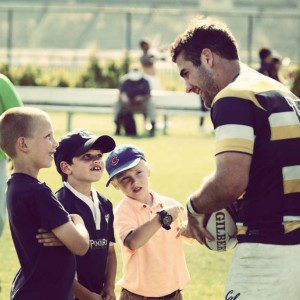
A: I have come to love the Bay Area, but they could no doubt use some driving lessons and a little more urgency. I’d say I started getting used to them when I realized I couldn’t handle the cold anymore at home, so it was “If you cant beat em, join em.”
Q: During your time at Cal, you were part of two national championships. Was one sweeter than the other? What do you remember about each?
A: The 2011 Championship was extremely special; it was really a great team and to win in front of a very large partisan crowd was a tremendous experience. But, the most distinct memory from both was the sense of accomplishment that comes from achieving something you and your teammates put so much into.
Q: On top of the championships, but you were an All-American four times. What was it like to be named an All-American not once, but four times? Was one better than the others?
A: Being named an all-American is an honor, something I am truly grateful for. Being named one four times is a testament to the great teams I have been apart of. Being selected to co-captain the 2012 tour to Ireland was particular special for me.
Q: When you weren’t on the pitch or in the weight room, what were some of the things you liked to do while you were at Berkeley?
A: If I am not on the field or in the weight room I’m usually in the classroom, the education here has been challenging to say the least. But outside of that, I love just hanging out with friends; doing whatever comes up. Maybe join a protest or two…
Q: What was it like to represent the United States for the first time on the under-20 union team?
A: Actually, my first time representing the USA was with the U-17s in Milfield under Coach Sean O’Leary. It was a memorable experience that I’ll always have. The first time singing the national anthem before competing for the US was unreal.
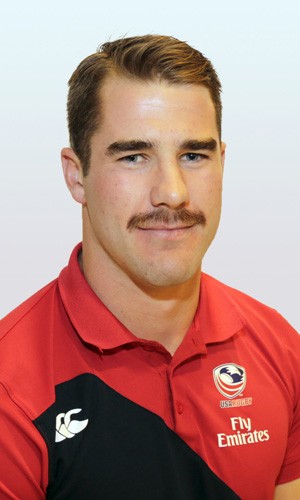 Q: Your debut for the National Team was on May 25, 2013, can you take me back to that day?
Q: Your debut for the National Team was on May 25, 2013, can you take me back to that day?
A: It was a rainy day up in ‘beautiful’ Edmonton, and I came off the bench for a few minutes of work. I was nervous as hell. I was able to get a good carry and settled my nerves, and I knew immediately I would want to do this again and again. I only played for about seven minutes, but I don’t think I’ve ever been more tired after a match
Q: You then made your first start for the United States only a couple of weeks later. How did it feel to see all of your hard work over the years finally pay off?
A: It was extremely fulfilling, but more so I was grateful to all the family, friends, teammates and coaches who helped me get there.
Q: In 2013, you represented both your college and nation at the same time, was that difficult to move back and forth from teams?
A: It’s always tough to be away from your team for a long period of time. The most difficult part is readjusting to the different systems and players for each.

Q: What players have you watched or watch that influence your play and what do you take from them?
A: Gordon D’Arcy and Brian O’Driscoll are great to watch, and I always try to pick up something from seeing them perform. But I would say I have learned the most from watching, listening and playing with Andrew Suniula.
Q: Do you have a favorite pro rugby team, and if so, which is it?
A: Leinster.
Q: Any aspirations to join the growing number of European-based Eagles if the opportunity arises, or does he prefer to stay Stateside for any number of reasons?
A: There are definitely aspirations to join the guys playing rugby over in Europe. I think it puts me in the best position to improve and ultimately improve my contribution to the Eagles.
Q: Would you prefer to play professionally in the Northern or Southern Hemisphere and why?
A: Getting paid to play rugby anywhere would work for me.
Q: Do you prefer playing outside what the Kiwis would call a second-five (play-maker, more like Folau Niua) or a hard-running 12 (Andrew Suniula).
A: I think at this point in my career, I’m still looking to improve on my skills to make me a better play-maker in the centers. But I love ball in hand and defending.
Q: What kind of adjustment is necessary going from playing for Cal, a club that is often vastly superior to the opposition at most positions, to any other rugby setting where the level of players from one team to the other is far more equal and the people surrounding him on the field are scrapping to survive?
A: Playing for the University we hold ourselves to our own high standards. Our film sessions for 100 point wins are often just as long as ones following losses. Keeping your own standards and caliber of play in mind no matter who the opposition is allows me to look past the opposition and focus on my own performance. It should come as no surprise that stepping up to international competition is a challenge, and when that happens I think backing yourself and the skills you have developed is the key to adjusting smoothly. But easier said than done.
Q: What are some of the goals for both yourself and your team going forward?
A: The goal for the team going forward is to perform to the best of our ability in every match remaining. For myself, firstly looking to give everything to the end of this season, graduate, then who knows.
Q: What’s the next biggest thing that could happen in rugby development in the United States?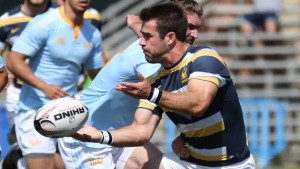
A: I would say qualifying for The Olympics, the exposure that would surely come with that will do a lot for the perceptions and popularity of the sport in the US.
Q: Do you have a significant other?
A: Yes…
Q: The ladies just sighed… Away from rugby; if you could sit down and have choice beverage with any three people, living or dad, who would they be?
A: Andrew Carnegie, Abraham Lincoln, Jerry Seinfeld.
Q: Describe your perfect day.
A: Bit of rugby in the morning, followed by a nice long day at the beach relaxing, finish the day up joining some friends for a steak dinner—filet mignon medium rare.
Q: Mets or Yankees?
A: Mets… Unfortunately
Q: If you could pick a pro sport, position and team, other than rugby, what would those answers be?
A: Professional Golfer, every time. Their job is to go out and play some golf. Seems like a pretty good deal, and I hear the pay is good.
Q: Is it true that your Freshman year at Xavier High School in NYC (a rugby powerhouse where you were coached by Team USA Head Coach Mike Tolkin), you wanted to come off the field because you had blisters on your feet? What did Coach Tim Walsh say/do?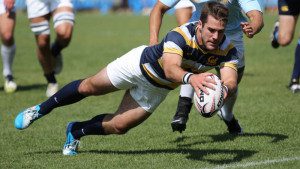
A: No comment…These were the worst blisters in the history of blisters. I look back on it as one of the more courageous actions in my life. In all seriousness, it was an important point in my development as an athlete. Tim first asked if I was kidding, then told me to suck it up (maybe with a few choice words.) I’ll always keep that experience with me, and I think it’s a big part of the mentality that has helped me be successful. I’ve never mentioned blisters again to this day.
Q: Between Xavier and Cal, you’re pretty much the product of the best path available to the National Team in this country – especially since there is no professional rugby. How can a kid not attending those schools get on the radar these days?
A: I have been really fortunate, Xavier was a great place to first experience rugby and I was lucky enough to have some great coaches. The opportunity to go to Cal and the experiences I have had here have been equally rewarding. I’ve been able to play along side some great players under world class coaching. For kids on a different path, I would say that hard work and true determination will get you where you want to be. I know its cliché, but its one of the few factors you are in control of at all times and therefore the best shot at success. Furthermore I think the parity at both the high school level and collegiate level between teams is rapidly improving, which is great.
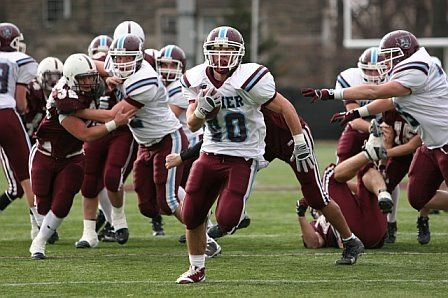 Q: You won on every level… Xavier, Cal… But with Team USA, you’ve had to deal with losing – and losing on the highest level. What is that like for you?
Q: You won on every level… Xavier, Cal… But with Team USA, you’ve had to deal with losing – and losing on the highest level. What is that like for you?
A: I have been apart of some great teams, USA included, where winning was the expectation. Losses are always tough, frequent or rare, what makes them easier to stomach is the effort put forth in the competition. Some of the losing efforts experienced with the US were extremely tough, however they were never due to a lack of desire or commitment, which made it easier to take the technical lessons of the day and apply them to the next effort. Winning is everything, and it’s the goal every time out, but losing occurs; not doing anything about it or becoming complacent with it is the danger.
Q: Finally, why do you continue to play rugby?
A: The fame and publicity… Rugby is the most challenging form of competition I have ever experienced, both mentally and physically, and that competition is addicting. Going up against another team—especially representing the United States vs. another country—and your opposite is major test of character and a big-time thrill.
Q: Thanks, Seamus.
A: Thank you.
Let’s all wish Seamus and his Golden Bear teammates good luck as they take on Central Washington today in the Varsity Cup Semifinals!

